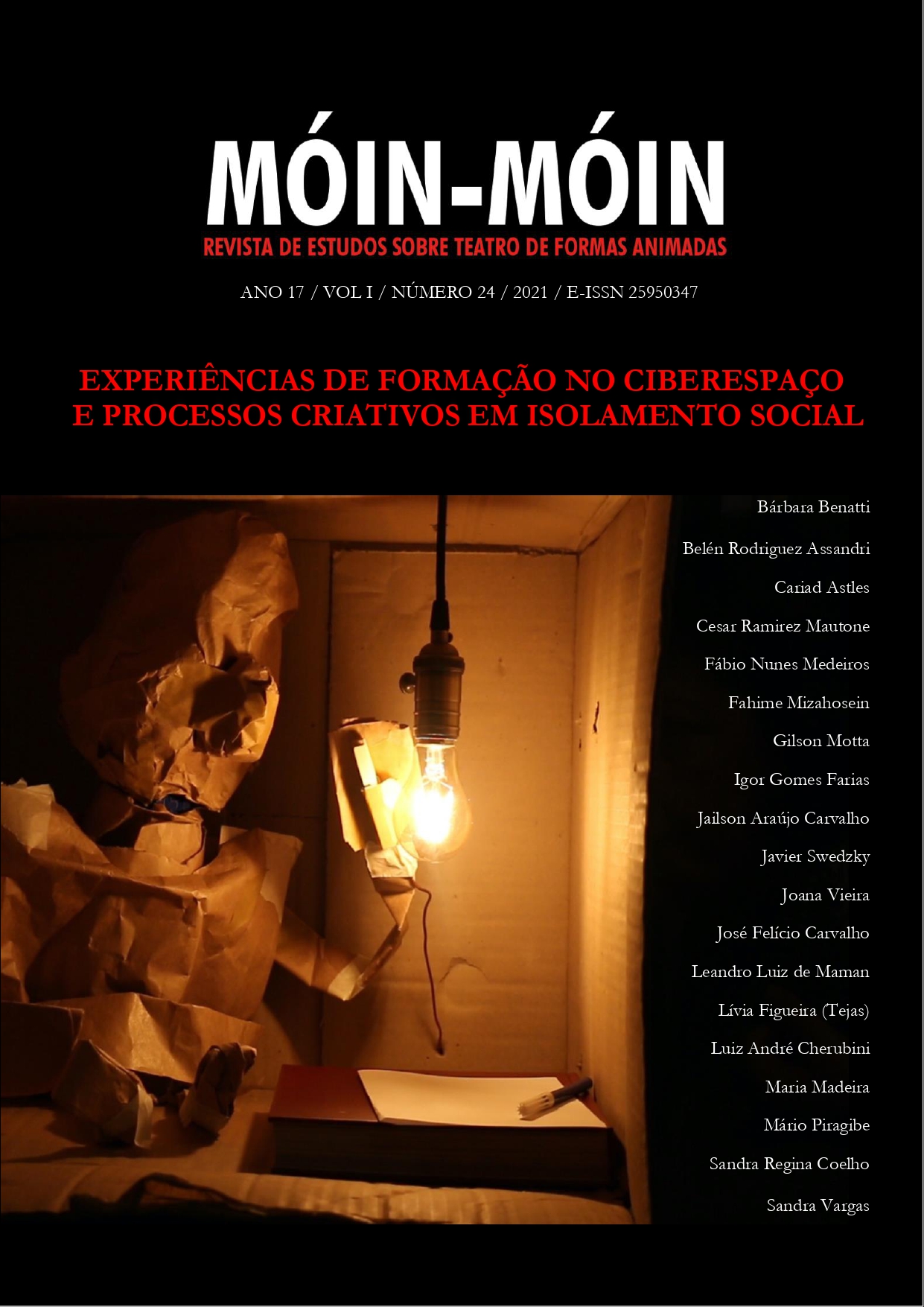Entre a máscara, a casa, a tela: frestas para o encantamento
DOI:
https://doi.org/10.5965/2595034701242021110Palavras-chave:
máscaras, ensino remoto, encantamentoResumo
A paisagem instaurada durante o isolamento social para a prevenção do contágio pelo novo coronavírus revela o agravamento (ou a irônica metáfora) de um projeto de enclausuramento dos corpos e da sensibilidade que ocorre desde os primórdios da colonização e aqui, inspirada pelas ideias de Luiz Antônio Simas e Luiz Rufino, apresento como um processo de desencantamento. No presente artigo compartilho os caminhos trilhados com a turma da disciplina Teatro de Máscaras da Licenciatura em Teatro da UDESC - cursada totalmente por via remota - nos quais utilizamos o espaço de casa, as telas, os materiais disponíveis naquele contexto e os principais alicerces da linguagem das máscaras como dispositivos de criação, para, mais do que visitar a ementa do curso - e como ato de resistência -, encontrar frestas na metafórica prisão e produzir vida e encantamento.
Downloads
Referências
BARROS, Manoel de. Poesia Completa. São Paulo: LeYa, 2013.
DUBATTI, Jorge. Experiencia teatral, experiencia tecnovivial: ni identidad, ni campeonato, ni superación evolucionista, ni destrucción, ni vín- culos simétricos. Revista Rebento, São Paulo, n. 12, p. 8-32. jan - jun 2020. Disponível em: http://www.periodicos.ia.unesp.
CARDOSO, H. Ator - Escultor de personagens. In: BELTRAME, V. N.; ANDRADE, M. (Org.) Teatro de Máscaras. Florianópolis: UDESC, 2010. p. 189-207.
CORTÁZAR, Júlio. Histórias de Cronópios e de Famas. Rio de Janeiro: Civilização Brasileira, 1998.
FABIÃO, Eleonora. Corpo Cênico, Estado Cênico. Contrapontos, Itajaí, SC, v.10, n.3, set-dez. 2010, p. 321-6.
FALEIRO, J. R. Copeau e a máscara. Urdimento - Revista De Estudos Em Artes Cênicas, 1(12), 2009, p. 101-110.
FERRACINI, Renato. Ensaios de Atuação.
FERRACINI, Renato. Presença e vida: os corpos em arte. In: VII Reunião Científica da Abrace (2013). Disponível em: http://www.portalabrace.org/viireuniao/tfc/FERRACINI_Renato.pdf.
FERRACINI, Renato; FEITOSA, Charles. A questão da presença na Filosofia e nas Artes Cênicas. ouvirOUver, Uberlândia, v.13, n.1, jan-jun 2017, p. 106-18.
FUSETTI, Giovanni; WILSON, Suzi. The Pedagogy of the Poetic Body. In: BRADBY, David; DELGADO, Maria (eds). The Paris Jigsaw: Internationalism and the City’s Stages. Manchester: Manchester University Press, 2002. [Artigo que contém a versão não editada de diálogo entre Fusetti e Willson, realizado em Pádua, Itália, 2000.
GALEANO, Eduardo. O livro dos abraços. Porto Alegre: L&PM, 2009.
LECOQ, Jacques. O Corpo Poético: uma pedagogia da criação teatral. São Paulo: Editora Senac / Editora Sesc São Paulo, 2010.
LECOQ, Jacques. The Theatre of Movement and Gesture. New York: Routledge, 2006.
RUFINO, Luiz e SIMAS, Luiz Antonio. Encantamento: sobre política de vida. 1º ed- Rio de Janeiro: Mórula Editorial, 2020.
VELOSO, Caetano. Nu Com a Minha Música. Outras Palavras. Phillips [1981]. Disponível em: https://www.youtube.com/watch?v=G-8ww0MCYbw. Acesso em 30/05/2021.
VIANNA, Tiche. Para além da Commedia Del’Arte: a máscara e sua pedagogia. Campinas, 2017. Tese (Doutorado) – Instituto de Artes, UNICAMP.
Downloads
Publicado
Como Citar
Edição
Seção
Licença
Copyright (c) 2021 Móin-Móin - Revista de Estudos sobre Teatro de Formas Animadas

Este trabalho está licenciado sob uma licença Creative Commons Attribution 4.0 International License.
Ao submeter um artigo à Móin-Móin Revista de Estudos Sobre Teatro de Formas Animadas e tê-lo aprovado os autores concordam em ceder, sem remuneração, os seguintes direitos à Revista: os direitos de primeira publicação e a permissão para que a Revista redistribua esse artigo e seus metadados aos serviços de indexação e referência que seus editores julguem apropriados.
Os artigos cujos autores são identificados representam a expressão do ponto de vista de seus autores e não a posição oficial da revista Móin-Móin.
Plágio, em todas as suas formas, constitui um comportamento antiético de publicação e é inaceitável. A Revista Móin-Móin reserva-se o direito de usar software ou outros métodos de detecção de plágio para analisar os trabalhos submetidos.
![]()
Este obra está licenciado com uma Licença Atribuição-NãoComercial 4.0 Internacional






